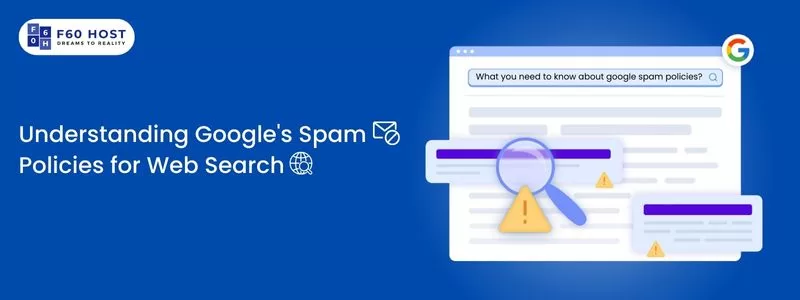Understanding Google’s Spam Policies for Web Search: What You Need to Know

Why You Should Care About Google’s Spam Policies
As the world’s most popular search engine, Google has a responsibility to provide users with the most relevant and high-quality search results possible. To achieve this, Google has implemented a number of spam policies for its web search results. In this blog post, we’ll take a closer look at what these spam policies are, why they’re important, and what you can do to ensure that your website stays in compliance.
What Are Google’s Spam Policies for Web Search?
Google’s spam policies for web searches are designed to prevent websites from engaging in manipulative tactics to rank higher in search results. These policies are constantly evolving and are enforced by Google’s algorithms and manual reviews. Some of the most important spam policies for web searches include:
Keyword stuffing: This involves using excessive and irrelevant keywords in content or meta tags to manipulate search rankings. Keyword stuffing can make your content unreadable and provide a poor user experience, which can lead to penalties from Google. For example, a website might repeatedly use the same keyword over and over again on a page in an attempt to rank higher for that keyword. Just make sure that the keyword density should be 1% in your blog
Link schemes: These are practices that attempt to manipulate the number or quality of links pointing to a website, including buying or selling links, link farms, and automated link exchanges. Link schemes are often used to try to improve a website’s PageRank, which is a measure of how important Google thinks a website is. Examples include buying links, exchanging links with other websites, or creating networks of websites solely for the purpose of linking to each other.
Hidden text or links: This involves using techniques to hide content or links from users but still make them visible to search engines in an attempt to manipulate search rankings. The purpose is to include additional keywords on a webpage without making the content visible to users. For example, a website might use white text on a white background to hide keywords or use CSS to hide links in a way that they are still visible to search engines but not to users.
Cloaking: This is a practice where a website presents different content or URLs to users and search engines in an attempt to manipulate search rankings. his tactic is often used to manipulate search engine rankings by including hidden or spammy content that is not relevant or useful to users. For example, a website might show different content to Google than it does to users in an attempt to rank higher for certain keywords.
Thin content: This involves publishing low-quality content that provides little or no value to users. Narrow content can include pages with little text or duplicate content, as well as pages with irrelevant or spammy content.
User-generated spam: This includes spammy comments, forum posts, or user-generated content that violates Google’s policies. This can include things like fake reviews or comments, or content that is unrelated or irrelevant to the website or page it’s posted on.
Malware and phishing: Websites that contain malware, viruses, or phishing attempts are penalized in search rankings. Malware and phishing attempts can harm users and are taken very seriously by Google. Website owners should take measures to secure their websites and protect against malware and phishing attacks, such as using secure hosting and regularly scanning for vulnerabilities.
Why Are These Spam Policies Important?
Google’s spam policies are essential for several reasons. First, they help ensure that users get the most relevant and high-quality search results possible. By penalizing websites that engage in manipulative tactics, Google can maintain the integrity of its search results and provide users with the best possible experience.
Second, these spam policies help level the playing field for businesses and websites. By penalizing those who engage in manipulative tactics, Google can reward those who create high-quality content and provide a great user experience. This means that businesses and websites that play by the rules are more likely to be rewarded with higher search rankings and increased traffic.
Finally, these spam policies help protect users from harmful content and scams. By penalizing websites that contain malware, viruses, or phishing attempts, Google can protect users from potential harm and ensure that the internet remains a safe and secure place.
What Can You Do to Ensure Your Website Stays in Compliance?
To ensure that your website stays in compliance with Google’s spam policies for web searches, there are several things you can do:
Follow Google’s Webmaster Guidelines: Google’s Webmaster Guidelines provide best practices for creating high-quality, user-friendly websites. Following these guidelines can help ensure that your website stays in compliance with Google’s spam policies.
Avoid manipulative tactics: Don’t engage in manipulative tactics like keyword stuffing, link schemes, hidden text or links, cloaking, or user-generated spam. Instead, focus on creating high-quality, useful content that provides value to users.
Monitor your website regularly: Regularly monitor your website for any signs of spam or manipulative tactics. Use tools like Google Search Console to check for manual actions or penalties and address any issues promptly.
Stay up-to-date with Google’s policies: Google’s spam policies are constantly evolving, so it’s important to stay up-to-date with any changes or updates. Follow Google’s Webmaster Central Blog and other industry blogs to stay informed.
Work with an SEO professional: If you’re unsure about whether your website complies with Google’s spam policies, consider working with an experienced SEO professional. They can help you identify and address any issues and ensure that your website stays in compliance with Google’s guidelines.
Conclusion
Google’s spam policies for web searches are an important part of maintaining the integrity of search results and protecting users from harmful content and scams. By following these policies and creating high-quality, user-friendly content, businesses and websites can improve their search rankings and provide a great user experience. Stay informed and up-to-date with Google’s policies and work with an experienced SEO professional if needed to ensure that your website stays in compliance. for more information you can follow us on Twitter, Linkedin



